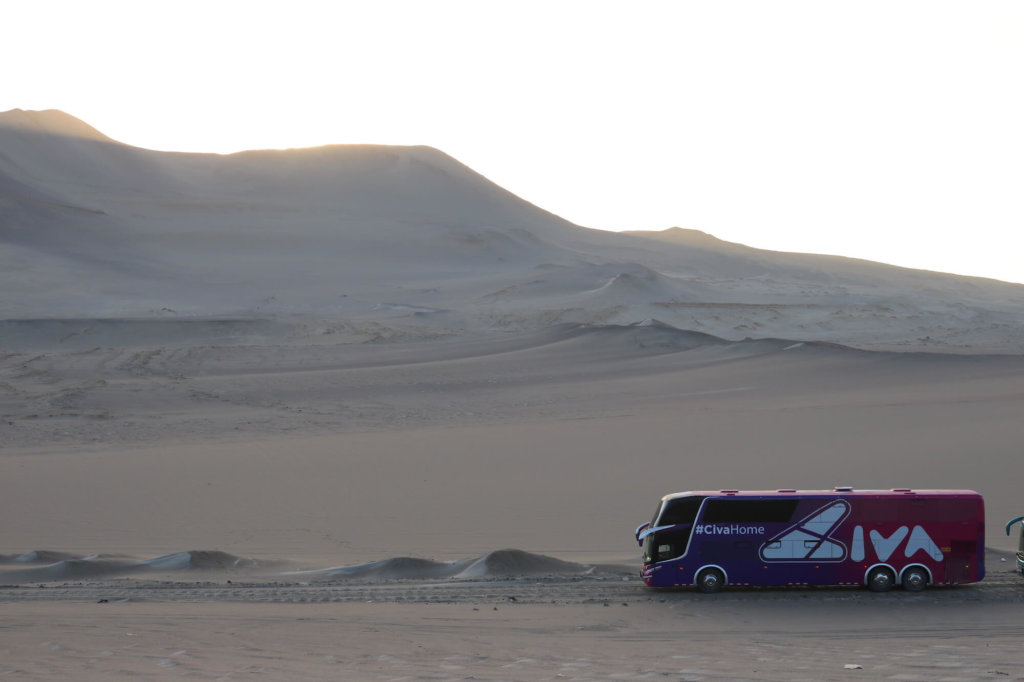Jose Juan Ciccia and Victor Jose Alfaro are both second-generation members of successful Peruvian family businesses. Jose runs CIVA, the tourism, transport and logistics company created by his father in the 1970s. Victor is in charge of one of Peru’s largest medical technology suppliers, Sistemas Analiticos, founded by his parents in 1993.
Having met at various functions over the years, the pair were finally brought together in 2018 by the desire to make a difference in Peru, a country still recovering from the deep economic recession and fundamental social upheavals of the 1990s. As the CEO of Sistemas Analiticos, Victor came to understand the staggering scale of a problem with the Peruvian healthcare infrastructure – the scarcity of transfusable blood available to Peruvians, especially those living outside major cities. He had the technology and the expertise; all he needed was a bus. It was then that he came to Jose with the idea of creating a “mobile blood bank.”
Tharawat Magazine sat down with both Jose and Victor to talk about the logistics of converting a bus made to carry tourists into a mobile blood bank, commonalities between second-generation family business members, and the role of private industry in solving societal problems.
Where did you first get the idea for a mobile blood bank?
Victor: The healthcare sector in Peru has been continuously evolving. We used to sell basic tools to professionals in the industry; today, we deliver automated equipment that improves the accuracy of diagnostic results. Our industry depends on this type of technology, and we have competition from well-established multinationals.
Despite the advances in the field, many people are dying because they don’t receive the help they need. Around 50,000 people died in Peru last year simply because they needed a blood transfusion and blood wasn’t available. Reaching the closest hospital or clinic can often take half a day, which is more time than many people have. Our idea was to solve the problem by reaching those people ourselves.
“…We share the same values. We’re both the second generation of family-owned businesses, we’re both part of an association that promotes making generational change smoother, and we both want to contribute to society.”
How did you get involved, Jose?
Jose: We connected through the Peru Family Business Association. Cynthia, the association’s general manager, told me about Victor’s project and mentioned he was looking for some buses. I was the guy with buses.
We’d seen each other at dinners with the Association before, but this was the first time we’d talked about collaborating on a project together. The first time we discussed the initiative, we were immediately on the same page, but it was Victor who had the vision. I was able to help with the logistics.
Victor: I think we share the same values. We’re both the second generation of family-owned businesses, we’re both part of an association that promotes making generational change smoother, and we both want to contribute to society.
I had been working to make this project possible since 2014, but I was still looking for help from other companies. When I shared my idea with Jose, there was no doubt that we could create the mobile blood banks and make a positive impact in our community if we worked together.
“…Imagine the impact we could have on the entire country.”
How many buses are you planning to have?
Victor: Once we get the first bus on the road, we will follow quickly with a second and a third. If we run the bus twice a month, we believe we can collect around 7,000 units of blood each year.
One unit of blood can save almost three lives, so we could potentially save the lives of 21,000 people each year. If we run the bus three or four times per month, imagine the impact we could have on the entire country. We aim to save as many lives as possible, and scaling up from one to multiple blood collections a month will benefit many communities.
Jose, how did you repurpose the bus for this project?
Jose: At CIVA, we have repurposed buses before, of course. For instance, for a project we called ‘Silva,’ we created a basecamp-type vehicle with various electrical parts and air conditioning; that was a fantastic learning experience for this project.
When Victor told me about the mobile blood bank, he said he wanted two-storey buses and explained what equipment was needed. The second floor is where blood donations take place, and the first floor is where the blood bank is located. I’ve repurposed a few buses in this way, such as mobile restaurants that needed a fit-out, and it’s a useful way to separate the various aspects of the business.
Once we had the equipment we needed, we focused on making it comfortable for people using one of our buses.
He had the logistics to take the blood, and we had the logistics to operate, manipulate and maintain a bus suitable for this project.
What part does family play in each of your companies?
Victor: Sistemas Analiticos is a company that focuses on technology to improve organ transplants, clinical laboratory diagnostics and blood bank processes. My parents founded the company 26 years ago; now we have 115 employees. I’m the CEO of the company, and I work with three of my brothers, who are in various senior roles. This year I hired the second line of non-family management in order to prepare the organisation for new challenges and needs at Peruvian healthcare sector.
[ms-protect-content id=”4069,4129″]
Jose: CIVA started 48 years ago when my father decided to convert two trucks into buses. He would buy fruit, beer and other products to deliver from the countryside into the city. He started in a town called Canchaque in the north of Peru and grew the business from there.
When the revolution came, and new roads were built, that helped the company grow, especially when the economy recovered after the 1990s. Right up until his death in 2006, my father was a bohemian. Even though he’d been a politician, he loved building relationships, and that helped the company grow little by little.
Since then, we’ve automated processes and expanded the fleet. We have doubled our staff, and my uncle and I currently own the company. I also have three cousins who play various roles in management, operations and administration. The financial director is from outside the family, but he was a trusted confidante of my father.
Do you think family businesses are better equipped to tackle philanthropic and societal problems?
Jose: Family firms like to leave a legacy, so there is a greater chance of successful philanthropy in family businesses.
Philanthropy has been an important part of my father’s business since before I took over. He was an avid sponsor of local sports teams and educational programs throughout his entire life.
We have a philosophy in our company that we always try to make a change for the better when the opportunity arises. However, we want to do it in the right way. We look at what we can afford, and we pick the option that can have the most impact.
Victor: This is how these kinds of projects start; we wanted to make a change, to bring together companies that wish to leave legacy. Corporate social responsibility is a priority, and saving lives is a strong motivator for any company regardless of economic sector.
We’d like to continue by transforming additional buses so that we can go out more than once per month – imagine the changes we could make then.
Like us, many other companies are getting involved, engaging with and improving the quality of life in their communities. We hope this socially responsible practice becomes the norm going forward.
[/ms-protect-content]

